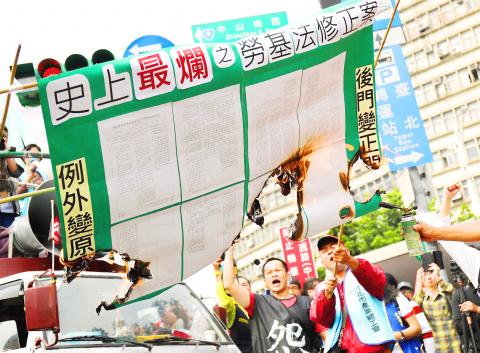Hundreds of workers and representatives of dozens of labor rights groups yesterday rallied in front of the Executive Yuan in Taipei to protest proposed amendments to the Labor Standards Act (勞動基準法), which they said would set back working conditions by 30 years.
The proposal is the “worst” piece of labor legislation as it would raise the ceiling on the number of consecutive working days from six to 12 days, while allowing industries to lower the minimum rest time between shifts from 11 hours to eight hours, they said.
The amendment runs counter to President Tsai Ing-wen’s (蔡英文) pledges to lower overall working hours while increasing salary levels, protesters said.

Photo: CNA
Medical Industries Union chairperson Chen Yu-feng (陳玉鳳) said medical professionals are regularly overworked and sleep-deprived as they are rarely allowed proper rest time between shifts, and the amendment would worsen their working conditions.
Sleep-deprivation is similar to being drunk and medical professionals who lack sleep would be taking care of patients in a state similar to intoxication, Chen said.
“As a doctor, Premier William Lai (賴清德) lacks medical ethics,” Chen said, calling Lai an “accomplice of capitalists” and demanding his resignation.
While the premier has proposed a series of policies aimed at solving industrial shortages, such as water and electricity, workers also have to face “shortages of health, dignity, rest, salary and union protection,” Solidarity Labor Union secretary-general Huang Yu-te (黃育德) said.
Kaohsiung City Confederation of Trade Union deputy director Chiang Chien-hsin (江健興) challenged Cabinet members’ statements that workers in central and southern Taiwan “like working overtime,” saying Taiwan’s average number of working hours already far surpass other countries.
Longer working hours do not necessarily translate into economic competitiveness, as Taiwan’s annual average working hours of 2,142 hours far exceed Japan’s 1,745 hours, Chinese Culture University law professor Chiu Chun-yen (邱駿彥) said.
The amendment, which will raise the maximum overtime hours from 46 to 54 per month, but caps the three-month total at 138, would provide a legal ground for employers to ask workers to work overtime for up to 54 hours for four months in a row, Chiu said.
While the amendment would allow for a one-year extension of unused annual leave, protesters said that employers should obtain the written consent of employees, amid fears that employers might use it as a legal excuse to prevent workers from taking leave.
Chinese Nationalist Party (KMT) Legislator Lin Wei-chou (林為洲) said the draft amendment is overbiased toward businesses and the party would oppose legislation that worsens working conditions.

ANOTHER EMERGES: The CWA yesterday said this year’s fourth storm of the typhoon season had formed in the South China Sea, but was not expected to affect Taiwan Tropical Storm Gaemi has intensified slightly as it heads toward Taiwan, where it is expected to affect the country in the coming days, the Central Weather Administration (CWA) said yesterday. As of 8am yesterday, the 120km-radius storm was 800km southeast of Oluanpi (鵝鑾鼻), Taiwan’s southernmost tip, moving at 9kph northwest, the agency said. A sea warning for Gaemi could be issued tonight at the earliest, it said, adding that the storm is projected to be closest to Taiwan on Wednesday or Thursday. Gaemi’s potential effect on Taiwan remains unclear, as that would depend on its direction, radius and intensity, forecasters said. Former Weather Forecast

As COVID-19 cases in Japan have been increasing for 10 consecutive weeks, people should get vaccinated before visiting the nation, the Centers for Disease Control (CDC) said. The centers reported 773 hospitalizations and 124 deaths related to COVID-19 in Taiwan last week. CDC Epidemic Intelligence Center Director Guo Hung-wei (郭宏偉) on Tuesday said the number of weekly COVID-19 cases reported in Japan has been increasing since mid-May and surpassed 55,000 cases from July 8 to July 14. The average number of COVID-19 patients at Japan’s healthcare facilities that week was also 1.39 times that of the week before and KP.3 is the dominant

The Chinese Communist Party’s (CCP) working group for Taiwan-related policies is likely to be upgraded to a committee-level body, a report commissioned by the Mainland Affairs Council (MAC) said. As Chinese President Xi Jinping (習近平) is increasingly likely to upgrade the CCP’s Central Leading Group for Taiwan Affairs, Taiwanese authorities should prepare by researching Xi and the CCP, the report said. At the third plenary session of the 20th Central Committee of the CCP, which ended on Thursday last week, the party set a target of 2029 for the completion of some tasks, meaning that Xi is likely preparing to

US-CHINA TRADE DISPUTE: Despite Beijing’s offer of preferential treatment, the lure of China has dimmed as Taiwanese and international investors move out Japan and the US have become the favored destinations for Taiwanese graduates as China’s attraction has waned over the years, the Ministry of Labor said. According to the ministry’s latest income and employment advisory published this month, 3,215 Taiwanese university graduates from the class of 2020 went to Japan, surpassing for the first time the 2,881 graduates who went to China. A total of 2,300 graduates from the class of 2021 went to the US, compared with the 2,262 who went to China, the document showed. The trend continued for the class of 2023, of whom 1,460 went to Japan, 1,334 went to